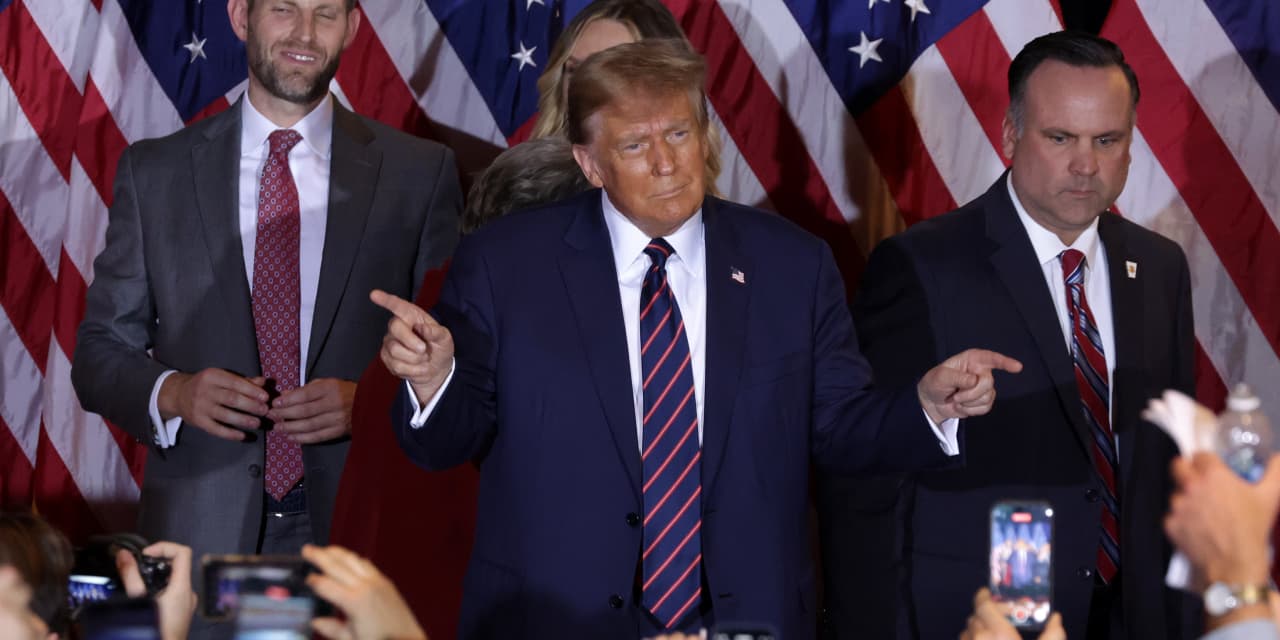Investors should prepare for Donald Trump to be elected president in November. The anger of the electorate that propelled his 2016 victory has increased since he narrowly lost to Joe Biden in 2020.
Trump’s acute legal troubles since he left office could capsize his candidacy, but the risk to bullish investors—who have been riding the market higher thanks to the Federal Reserve’s expected rate cuts—from a Biden win alone is immaterial. If Trump loses, however, the reaction of his political base could be so outrageous as to push stocks lower.
Back during Trump’s first presidential run, many investors feared his victory would derail stocks. Things are different this time. His pro-business bent is now well understood. The market’s recent performance has been so extraordinary that some investors opine that part of the strength seems to be investor anticipation of Trump’s return. The
S&P 500 index
is trading around record levels.
At least half of the U.S. will recoil from any positive characterization of Trump. The other half, and maybe more, will favor anyone who agrees that the greatest nation in the history of the world is governed by a political class in love with the sound of its own voices more than anything else.
These issues—often angrily discussed with friends and family—are yet to be fully reflected in the market narrative. If investors think the next presidential administration will be pro-markets, it could help consolidate the recent stock market gains, providing a more solid foundation for higher highs.
The challenge is stripping emotion from politics and treating Trump’s candidacy as a simple binary trade. The approach was popular during the 2007-09 financial crisis. Back then, many companies were perceived to have equal odds of living or dying. Investors who bullishly bet on America were richly rewarded.
If Trump is re-elected, the stock market should surge in celebration of his perceived policies. The thesis can be tested by watching how stocks react to news that clarifies Trump’s ability to remain on the ballot.
If Trump loses, he is unlikely to wish Biden well and urge his supporters to hug Democrats. The Jan. 6 insurrection might seem like a dance party compared with what could happen. Even now, the derivatives market is pricing the November election as a tumultuous market event.
Futures contracts that expire around the November election on the
Cboe Volatility Index,
or VIX, which measures anticipated stock market moves, seem unusually elevated. Inflation is declining and many investors are optimistic about the future. But the shape of the VIX curve portends drama.
To pre-position in anticipation that a Trump win sparks a stock rally, or that his loss sparks a potentially violent reaction, consider a “strangle strategy” on the
S&P 500
exchange-traded fund. The trade wins if the stock market moves sharply up or down.
With the ETF at $491, you could buy the December $520 call option and the December $470 put option. The call is worth $30 if the ETF is at $550 at expiration. At $440, the put is worth $30.
The trade expresses a belief that social media, foreign government propagandists, and even some mainstream media outlets will try to manipulate the U.S. electorate. Long-term thinking is thus difficult for many because they rely on an information diet that keeps them angry and anxious about the future.
The stressed emotional state is compounded by demographic shifts that have made many people dependent on rising stock prices. About 10,000 citizens turn 65 each day. Many cannot afford to retire.
If politics is indeed local, nothing beats a person’s economic well-being. That fact could attract voters to Trump even if they think his behavior often is repugnant.
Email: [email protected]
Read the full article here




